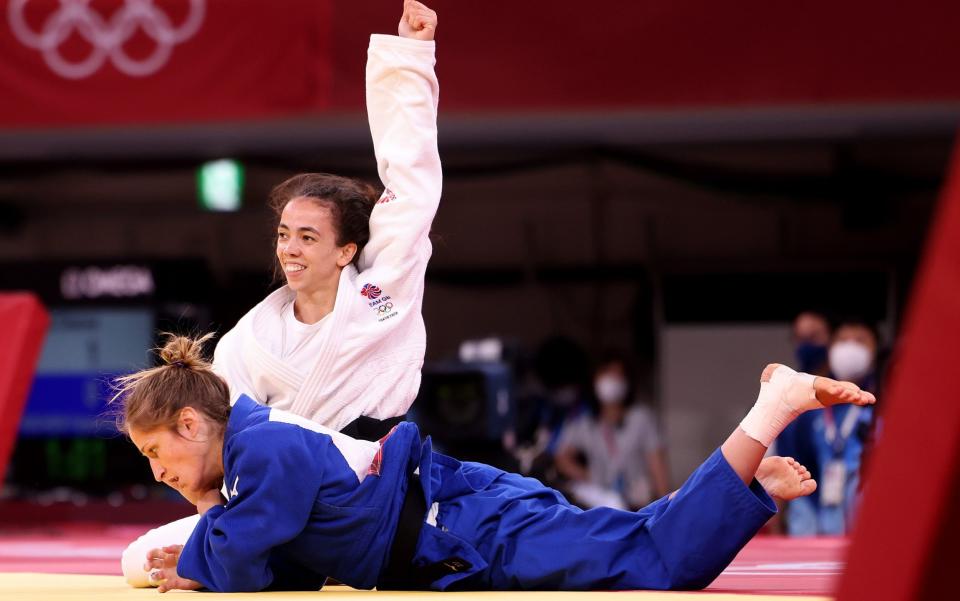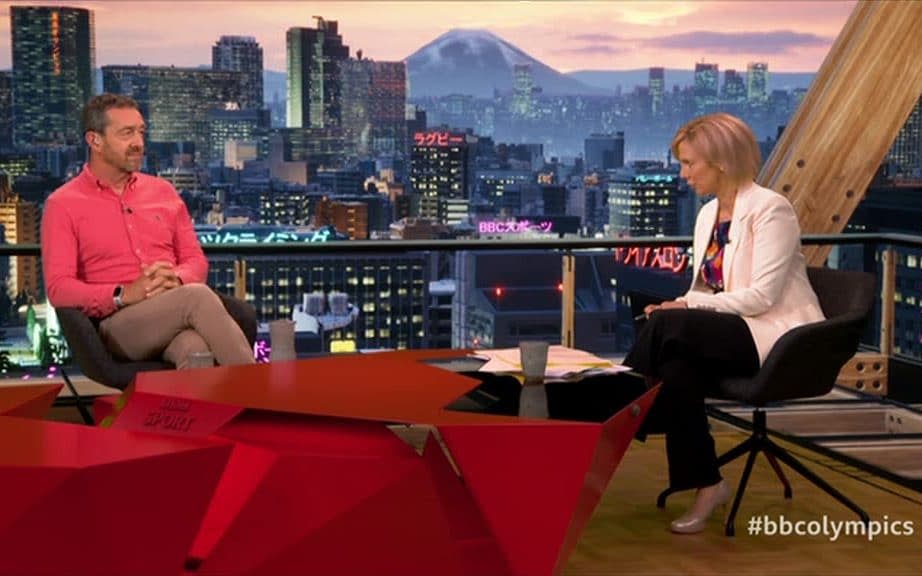BBC infuriates viewers after missing live coverage of Britain's first two Olympic medal-winners

BBC One was facing mounting anger over its Olympics coverage on Sunday after missing live coverage of Britain's first two medal-winners.
Viewers were left incandescent by the corporation posting online about Chelsie Giles winning judo bronze online while failing to show action.
The moment that guaranteed a silver in Taekwondo was also omitted for home audiences due to new contract restrictions limiting the corporation to two live sports at any one time.
Having failed to show Bradly Sinden in the semi-final, the broadcaster showed him in the final - but captioned him with the wrong martial art, judo, as he was denied a gold medal.
Historically-low opening ceremony viewing figures have added to the BBC's woes in Tokyo, with just 2.3million watching Friday afternoon's controversy-dogged curtain-raiser.
To put that into context, the Rio ceremony in 2016, which did not start back home until after midnight, drew a peak of 3.8 million. Both those ceremonies were dwarfed by the 26.9m watching Danny Boyle's 2012 London extravaganza. The Athens games in 2004, meanwhile, drew 8.68m.
The biggest worry for BBC executives is the frustration of viewers who have been unable to watch their favourite sports due to the Olympics' new pan-European deal with Discovery.
The BBC had controversially lost automatic hosting rights in 2015 after the International Olympic Committee allowed American giant Discovery to table a £920million offer which blew rivals out of the water.
Under Government 'Crown Jewel' broadcasting arrangements, the Olympics is guaranteed for free-to-air - but the BBC was only able to secure two live events at a time under the terms of a sub-licensing agreement.
With broadcast bosses now having to gamble on is most likely to secure gold, there was no live BBC One coverage as Giles, who was not among the frontrunners, claimed Great Britain’s first bronze by defeating Switzerland’s Fabienne Kocher in the women’s -52kg judo.
Amid dozens of comments beneath a BBC tweet about Giles' bronze, one wrote: "It would have been useful if you at least flashed it up on screen that it was on the red button live. First medal and you missed it."
Another added: "Thanks for spoiling that given its on your main channel NOW….", while others said: "This match has literally just started and I already know the result... why is there such a delay in the broadcast versus your updates???? Ps CONGRATS Chelsie."
"It was on live on Eurosport," spotted one viewer, "but for some reason BBC decide to show it delayed on BBC One?"
It was the second successive day that the coverage had frustrated viewers. Dan Walker, a main host, had been forced to defend coverage after tennis, rowing and gymnastics fans woke up to find their sports were not being shown live on traditional free-to-air.
Viewers immediately complained in their droves after the road race was prioritised for extended periods, with tennis fans expressing concerns that they may be waiting until Thursday for their sport to be shown at all.

The chairman of British Rowing, meanwhile, also expressed bemusement at his sport’s lack of airtime, while Sir Matthew Pinsent, the four-time gold medalist, warned that “rowing will get pushed aside often” in the days ahead.
The situation has already frustrated numerous senior figures at BBC Sport. A source close to American rights-holder Discover had told Telegraph Sport prior to the Games that they were confident wall-to-wall offering on Discovery+ could start tempting traditional BBC viewers over.
However, Discovery and Eurosport had their own problems after enduring a day of broadcasting gaffes in its coverage.
The BBC, meanwhile, said its reduced live broadcasting arrangements had been known since 2017. A spokesman added that “will continue to bring extensive coverage from the Games including all the must see moments”. However, he added: “The BBC is no longer able to offer live streams of every sport during the Olympics due to the terms of the licensing arrangements laid down by the rights-holder (Discovery).”
Telegraph Sport understands 2.4million tuned in to watch BBC highlights of Friday's ceremony. By Saturday morning, 2.7million were watching the men’s road race on BBC One.
The BBC was not alone in failing to generate huge numbers for the opening ceremony. In America, NBC's broadcast of an event that had been plagued by two sackings in a week drew 16.7 million viewers, the smallest US television audience for the event in the past 33 years.
'Lack of wall-to-wall coverage represents a slide back in time'
By Simon Briggs
“It’s just brilliant, brilliant, brilliant news that sport is taking place”, said Mark England – Team GB’s chef de mission – in an upbeat cameo on the first edition of the BBC’s Olympic Breakfast show.
Yet the public verdict on the BBC’s coverage was considerably less sunny. On social media, the queries flew in faster and harder than Jade Jones’s roundhouse kicks.
Where was the gymnastics? Why wasn’t there any proper footage of Andy Murray? And who was Dan Walker’s strident co-presenter in the orange dress?
The answer to the last question was Samantha Quek, a gold medallist in hockey from the Rio Olympics. As for the others, it usually came down to licensing.
At both the London and Rio Olympiads, the BBC were able to show every minute of every sport, whether via iPlayer or the Red Button. This time, Eurosport have the streaming rights, so poor old Ron Chakraborty – the BBC’s head of major events – can only pick two events to broadcast at any given moment.

In effect, we have slid back a couple of decades – to a time when BBC1 and BBC2 were all we had, and everyone still watched sport on a black box in the corner of their living room. Sadly, though, we don’t have the compensating bonus of Des Lynam to anchor the coverage.
How quickly we become spoiled! When you’ve spent the last few Games feasting at a pick-and-mix counter, a binary choice between wine gums and jelly babies suddenly seems deeply unsatisfactory. Maybe you wanted the strawberry bonbons all along?
The same goes for Chakraborty’s decisions. For someone, somewhere, it was always going to be The Wrong Sport.
I know what you’re thinking. Is this going to be another whinge about how the BBC has let us all down? Another diatribe calling for Auntie to be euthanised without further ado?
Not exactly. I mean, I do have the odd gripe. To a cycling agnostic like me, the road race felt as never-ending as an entire Tour de France, especially once the leading British contender had crashed out in the early stages. I’d rather have watched the Open University lectures that used to run at this unearthly hour.
Overall, though, the BBC coped bravely with a weak hand. Especially as (spoiler alert) the presenters are all siting in an empty green studio in Salford. For all the vividness of their virtual Tokyo backdrop, there is no crowd to feed off and no local colour. One unfortunate commentator, presented with the Olympic debut of table-tennis star Tin-Tin Ho, was reduced to a desultory mention of the score from time to time.
If these Olympics feel like a journey into the past, then that suits the more experienced hands, who are already standing out from the pack. It must be tricky for a newcomer to settle when everything is done remotely – or “off tube”.
As usual within BBC broadcasting circles, Scottish voices have led the way. Andrew Cotter and Hazel Irvine were laconically brilliant during the Opening Ceremony, combining gravitas with gentle humour in a manner that Terry Wogan might have admired. What’s more, they kept it up for the best part of four hours.
Then, when Irvine returned to our screens in the afternoon for the final session – the Adam Peaty session, in this case – she brought a sense of reassurance with her. Like Steve Rider a couple of decades ago, she is unflashy and impeccably professional – the ultimate safe pair of lips.
After all the grumbles and grousing of the early morning, Irvine was the right captain to steer the BBC’s battered flagship into port. And the social-media debate now switched to safer subjects. Where on earth, asked one tweeter, did she get that lovely dress?

 Yahoo Finance
Yahoo Finance 